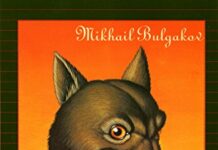
Ebook Info
- Published: 2009
- Number of pages: 108 pages
- Format: EPUB
- File Size: 0.26 MB
- Authors: Mikhail Bulgakov
Description
WITH A NEW INTRODUCTION BY ANDREY KURKOVA rich, successful Moscow professor befriends a stray dog and attempts a scientific first by transplanting into it the testicles and pituitary gland of a recently deceased man. A distinctly worryingly human animal is now on the loose, and the professor’s hitherto respectable life becomes a nightmare beyond endurance. An absurd and superbly comic story, this classic novel can also be read as a fierce parable of the Russian Revolution.
User’s Reviews
Reviews from Amazon users which were colected at the time this book was published on the website:
⭐One of the most delightful aspects of Bulgakov’s work, which was banned until well after his death, is the success with which he presents the workings and concerns of a dog’s mind.Here’s how the dog learned to hunt for food in post-revolutionary Moscow without a proper education and reading lessons:”After that, his learning proceeded by leaps and bounds. He learned the letter `t’ from `Fish Trust’ on the corner of Mokhovaya, and then the letter `s’ (it was handier for him to approach the store from the tail end of the word, because of the militiaman who stood near the beginning of `Fish’).”Tile squares set into corner houses in Moscow always and inevitably meant `cheese.’ A black samovar faucet over the word indicated the former owner of Chichkin’s, piles of red Holland cheese, beastly salesmen who hated dogs, sawdust on the floor, and that most disgusting, evil-smelling Beckstein.”If somebody was playing an accordion, which was not much better than `Celeste Aida,’ and there was a smell of frankfurters, the first letters on the white signs very conveniently added up to the words `no inde…,’ which meant `no indecent language and not tips.’ In such places there were occasional messy brawls and people got hit in the face with fists, and sometimes with napkins or boots.”If there were stale hams hanging in a window and tangerines on the sill, it meant… Grr…. grr… groceries. And if there were dark bottles with a vile liquid, it meant…Wshi-w-i-wines…The former Yeliseyev Brothers.”You get the idea. The charm of “Heart of a Dog” lies in the simple sci-fantasy chosen by the author to regale us with true portraiture of life in the time and place with which it concerns itself, without ever appearing episodic, preachy, or issue-driven.The four paragraphs abstracted above move the story along, maintaining the humor (and pathos) involved in mapping a dog’s mind, but also telling us something of the moment’s popular music, of the behavior that could be witnessed on the city streets, and rendering a street economy that one would assume is a thing of the past.But the narrative, in the end, is not entitled “Mind of Dog.” It is “Heart of a Dog,” and soon we move beyond the concerns of the canine, to those of the larger cast assembled by the author to make certain points about the reorganization of Russian life into soviet structures and concepts.Truly revolutionary.The dog is taken in off the street by Doctor Philip Philippovich Preobrazhensky who, even in the leveling times he was tapped to live, is a man of prestige and means.”Heart of a Dog,” falls clearly into the category of satire and, as such, spares no one.Preobrazhensky is up to no good with some scary eugenic operations that are enhancing the vitality and sexual capacity for some of Moscow’s wealthier denizens. When the communist housing committee comes to bust his chops about the size of his apartment and the new times which the doctor must reconcile himself to, he makes a call to one of his patients, influential in the recently imposed Bolshevik order, that results in the committee delegates leaving his place with tails between their legs.But Philip Philipovich’s time will come.The dog, whom he and his helper Bormenthal have dubbed “Sharik” is startled from the peaceful life in the too-big-apartment he could hardly believe luck had placed him, to have the brain stem of a deceased common criminal grafted onto his own.The experiment goes awry and Sharik slowly morphs into a man; a complicated man with opinions, desires, and an appetite for cats – a man with a dog’s heart that the doctors Preobrazhensky and Bormenthal are ill-equipped to control.He smokes, has no sense of social correctness, hits on the resident young girl Zina, and has a wise-guy’s mouth to boot. “An exceptional scoundrel,” in Preobrazhensky’s words.Disdained and pushed to the margins by the bourgeois technicians who created him, Sharik does what came naturally to people (or dogs) in those days. He becomes a communist and gets “papers” attesting to his officially recognized existence as Polygraph Polygraphovich Sharik.He gets a good job in the municipal department, purging cats, and finally forces the hand of Philip Philippovich by again springing the local aparatchiks on him over the size of his apartment and the way its space is apportioned.Pushed to the brink, the doctors do something to Sharik, it is not clear what, that returns him to the state of grateful mongrel in which he originally entered the premises.We can view this story as a commentary on the open-ended fear the aspirations of science and modernity imposed upon people at the turn of the last century. It can also be savored as a parable on Soviet life as it seemed shortly after the revolution.Okay, the scribe doesn’t really know what a parable is, he just wanted to sound lit-critical for a second.Perhaps the better expression is “analogy” or even, “metaphor.” the scribe thinks that these words along with `simile’ and a few others only serve to slice the same ham a lot of thin ways and that they should come up with a better, all purpose, word to meet the utilitarian tone of our times.In any case, it’s clear Bulgakov had an ironic view of the Bolshevik order and the underlying idea of sweeping away all that had come before to replace it with something more egalitarian. We don’t get a sense he was against it on principles, rather that he was mortified by what happened when it was applied to a giant and backward czarist peasant state.the scribe’s sense is that he is saying a dog’s a dog, and a prole’s a prole, regardless of what rational experiment, social or scientific, you expose them, too.There will always be, Bulgakov seems to be saying, complicated matters of the heart that surpass the grasp of even our most enlightened and talented citizens.Post-revolutionary Russia is now a ways off. We do not know what song the doctor is always singing, “from Granada to Seville…” and so we miss its cultural significance and what it means to come out of Preobrazhensky’s mouth as well.Still, the literature transports us.The version read by the scribe (Grove Press) is translated by Mirra Ginsburg. Translations are always tricky. We can only hope they approximate what the original language was cleverly employed to convey. Ginsburg recreates an over-the-top type of nineteenth century idiom in the tone of, let’s say, G.K. Chesterton (“The Club of Queer Trades”).”My good sir, I will not be made a guy of with this preposterous…”Maybe, hopefully, that is what Bulgakov had in mind. To be sure, the high-flown pompousness of his hosts certainly contrasts with the low-flung desires and needs of the proletarian dog.Woof.
⭐Great “little-big book” although a horrible print job and poor translation; just as another reader describes it, this was probably printed using a word recognition program which “misread” combination of letters. Choices of words are often very poor, as if translated by google. Russian slang specific of the early communist era is peppered with self-loathing and deprecating expresions aimed at both the tyrants and at the enslaved alike. The easier way to try to understand this world better is to think of Communism as a fable happening on a joyless planet from where there is no escape (just as no one can escape gravity) and where the spectrum of feelings ranges only between envy and negative reinforcement. Just one specific example of missing the mark on translation: A “Dustman” happens to be just another job in the western world (in some cases, one relatively well paid too), but in the communist cultural context, it is a derogatory call aimed to portray a worthless person. The intent is to comprise in one word an unkempt smelly imbecil and crude day-laborer, just an inch above the animal level, whose existence happens between work and vodka. A better transaltion would have been a made-up word such as a “Garbager”, or “Wastepusher”. Granted, that the cultural transformation of a human who grows up under socialism cannot be readily grasped in a free society. Almost one hundred years after its first disastrous application, which was repeated with same results dozens of times since, Westerners continue to dwell in and “toy” with the ideology of socialism. What is often idealized as a “classless society”, it turns out to be a horribly rigid cast system made up of the proletariat (ruling class), peasantry, intelectuality and “youth” (students) and within each there are further divisions based on favoritisms, nepotisms and Communist Party membership. The Eastern Europeans have lived thru the practical application of this abomination and for over half a century they endured the outcome of socialism in its two extreme forms which are strickingly similar: fascism (national socialism) and communism (materialist/atheist socialism). To try to understand the background of this book, it leads one thru the depressing journey of discovery of what the real “socialist promiseland” looks like. This is not easy to do when your other options are TV reality shows, fear factors or some weekly academy award show – ignorance in different forms… Describing the perils of conformity to mass ignorance of those who know and who could do better otherwise, can make for a grotesque true life comedy, but one which parallels the bitter tragedy of lives wasted at the altar of utopian ignorance. Except for the dog transformation, all other characters and their behavior, thoughts, acts, etc., are true depictions of the real life in the USSR – a world in which a half-human-half-dog happens to blend in perfectly. Read it and try to overlook the bad translation. We all carry the dormant socialist virus within us, which always becomes active when fed by the ignorance of the masses.
⭐Such as most of the books written by Bulgakov, this book is a literary jewel. Bulgakov describes a story in such a colourful way that it literally transports you back in time. He creatively describes a funny story which takes place in Moscow just after the revolution occurred.The novel provides the reader with two key fundamental themes that carry out in tandem:1. The story is hilarious, allowing the reader to absorb a ridiculously funny & creative story.2. Through the cultural representation, the general themes and remarks the fictional characters say in the novel one can actually grasp a deep-rooted message which describes the turbulent, significant, and historic events that took place during and after the revolution.In my opinion he basically described how the entire Russian intelligentsia were more or else persecuted and eradicated by a new authority. That new authority, which claimed to represent the ‘labor force’ actually was used by societies delinquents to exploit the new changes.
⭐Bulgakov’s short story ‘The Heart of a Dog’ had to wait approximately 60 years to be published in his home country, as it was seen as much too subversive for common consumption. In it, Professor Preobrazhensky ‘creates’ a new kind of creature from a stray dog – Sharik – an experiement that comes to haunt him. The book increasingly turns to the absurd after that but the main message and story get across all the more clearly as a result.The absurdity definitely adds a quite funny element to the book and it is definitely as entertaining a read as it is an enlightening one. Bulgakov’s medical training also shines through, making all but the ‘creation’ appear much more credible than an author without such training could manage.Given that the book was written in 1925 one cannot call Bulgakov’s work a harbinger of things to come, rather a summary of some of the excesses or problematic developments already present in the Soviet society several years into the communist experiment. Some equate Preobrazhensky with Lenin and this may well have been exactly what the author intended.If you are interested in understanding the motivations behind the communist experiment, as well as the disillusionment that followed, the book is a wonderful complement to works such as Koestler’s
⭐Darkness at Noon
⭐or
⭐Arrival and Departure (Twentieth Century Classics)
⭐(the latter more to do with extremism and resistance) and I can warmly recommend it even beyond its literary qualities, impeccable as they are in their own right.
⭐I was recommended this after reading the master and margarita, it’s just as weird as that book too! Although it’s easier to follow this book is.
⭐I don’t really go in much for social commentary, I like to read for the entertainment, so mainly see ‘just the story’ in most cases. The Heart of A Dog is like a circus, or a fantastical tale; it made me laugh out loud and yet also I was frustrated and mystified – much like the book’s main protagonists. But also it made me think about dogs that undergo research for scientific purposes. how do we know what they think, feel, and whether their experiments affect them? Similarly to The Plague Dogs, it affected me in a way that the author probably didn’t intend. but that’s the nature of good writing: to take the reader on a personal journey.
⭐If you are interested in Russian history this is ok.If you want to read Lenin crossed with Lewis Carol The Master and Margarita is outstanding.Peter Dickens
Keywords
Free Download The Heart Of A Dog (Vintage Classics) in EPUB format
The Heart Of A Dog (Vintage Classics) EPUB Free Download
Download The Heart Of A Dog (Vintage Classics) 2009 EPUB Free
The Heart Of A Dog (Vintage Classics) 2009 EPUB Free Download
Download The Heart Of A Dog (Vintage Classics) EPUB
Free Download Ebook The Heart Of A Dog (Vintage Classics)



